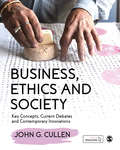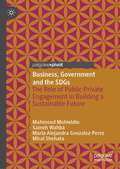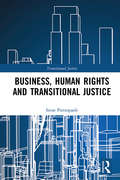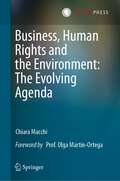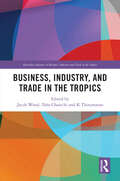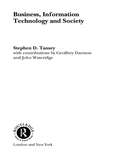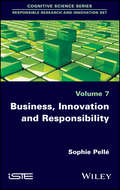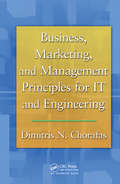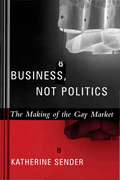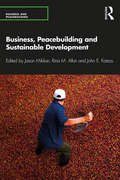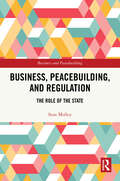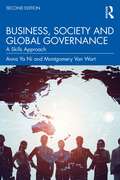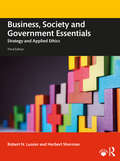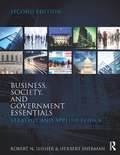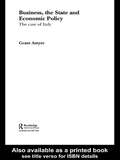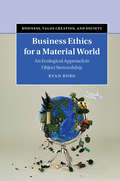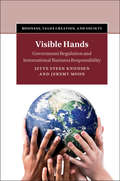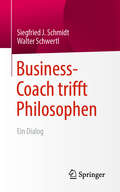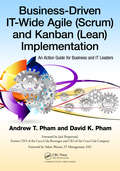- Table View
- List View
Business, Ethics and Society: Key Concepts, Current Debates and Contemporary Innovations
by John G. CullenWith an emphasis on psychoanalytic theory, Business, Ethics and Society: Key Concepts, Current Debates and Contemporary Innovations provides a clear, concise introduction to the field of business ethics, while addressing contemporary issues and debates around the impacts of artificial intelligence, social media, the gig economy and populist politics on business and society. The book features mini-case studies from a variety of contexts and companies, including Gillette, Nike, Dove, British Airways and Microsoft, as well as thought-provoking questions throughout. Also included are: - Learning objectives - Chapter summaries - Recommended reading Business, Ethics and Society: Key Concepts, Current Debates and Contemporary Innovations serves as an ideal introductory text for students of undergraduate business ethics-related courses. Lecturers can access a range of online resources for use in their teaching, including an instructor’s manual, PowerPoint slides and SAGE Business Cases.
Business, Ethics and Society: Key Concepts, Current Debates and Contemporary Innovations
by John G. CullenWith an emphasis on psychoanalytic theory, Business, Ethics and Society: Key Concepts, Current Debates and Contemporary Innovations provides a clear, concise introduction to the field of business ethics, while addressing contemporary issues and debates around the impacts of artificial intelligence, social media, the gig economy and populist politics on business and society. The book features mini-case studies from a variety of contexts and companies, including Gillette, Nike, Dove, British Airways and Microsoft, as well as thought-provoking questions throughout. Also included are: - Learning objectives - Chapter summaries - Recommended reading Business, Ethics and Society: Key Concepts, Current Debates and Contemporary Innovations serves as an ideal introductory text for students of undergraduate business ethics-related courses. Lecturers can access a range of online resources for use in their teaching, including an instructor’s manual, PowerPoint slides and SAGE Business Cases.
Business, Government and Economic Institutions in China (International Political Economy Series)
by Xiaoke Zhang Tianbiao ZhuThis book brings together conceptual and empirical analyses of the causes and consequences of changing business-government relations in China since the 1990s, against the backdrop of the country's increased integration with the global political economy. More specifically, it provides an interdisciplinary account of how the dominant patterns of interactions between state actors, firms and business organizations have changed across regions and industries, and how the changing varieties of these patterns have interacted with the evolution of key market institutions in China. The contributors to this edited volume posit that business-government relations comprise a key linchpin that defines the Chinese political economy and calibrates the character of its constitutive institutional arrangements.
Business, Government and Sustainable Development (Routledge Advances In Management And Business Studies #Vol. 28)
by Gerard KeijzersThe range of sustainability objectives has now developed from relatively simple issues of environmental protection to a full array of interwoven social, economic and ecological issues, nationally and internationally. The involved process of sustainable development has now become a permanent and increasingly complex process. In this insightful book,
Business, Government and the SDGs: The Role of Public-Private Engagement in Building a Sustainable Future
by Sameh Wahba Maria Alejandra Gonzalez-Perez Mahmoud Mohieldin Miral ShehataThis book seeks to revise and challenge the roles and traditional realms of influence that national and local governments, and businesses at a critical juncture in terms of achieving sustainable development, faces when tackling the dual challenges of climate change and post-COVID recovery. Using the broader lens of the 2030 UN Sustainable Development Goals (SDGs) to assess the roles and responsibilities of each of these stakeholders and their relationships, the book offers policy, economic arguments, case studies and examples to argue that neither national or local governments, nor companies, could afford to deviate from the SDGs in the recovery from the current crisis, nor that the imperative of bold climate action should detract from the broader focus on sustainability. The analysis frames the debate of how a balance between people, planet, and profits can be achieved and how nations, regions and cities, and businesses, with their representative organizations, can achieve a sustainable recovery from the current global crisis, and contribute to climate smart, resilient and inclusive development.
Business, Human Rights and Transitional Justice
by Irene PietropaoliThis book considers the efficacy of transitional justice mechanisms in response to corporate human rights abuses. Corporations and other business enterprises often operate in countries affected by conflict or repressive regimes. As such, they may become involved in human rights violations and crimes under international law ‒ either as the main perpetrators or as accomplices by aiding and abetting government actors. Transitional justice mechanisms, such as trials, truth commissions, and reparations, have usually focused on abuses by state authorities or by non-state actors directly connected to the state, such as paramilitary groups. Innovative transitional justice mechanisms have, however, now started to address corporate accountability for human rights abuses and crimes under international law and have attempted to provide redress for victims. This book analyzes this development, assessing how transitional justice can provide remedies for corporate human rights abuses and crimes under international law. Canvassing a broad range of literature relating to international criminal law mechanisms, regional human rights systems, domestic courts, truth and reconciliation commissions, and land restitution programmes, this book evaluates the limitations and potential of each mechanism. Acknowledging the limited extent to which transitional justice has been able to effectively tackle the role of corporations in human rights violations and international crimes, this book nevertheless points the way towards greater engagement with corporate accountability as part of transitional justice. A valuable contribution to the literature on transitional justice and on business and human rights, this book will appeal to scholars, researchers and PhD students in these areas, as well as lawyers and other practitioners working on corporate accountability and transitional justice.
Business, Human Rights and the Environment: The Evolving Agenda
by Chiara MacchiMore than ten years after the adoption of the UN Guiding Principles on Business and Human Rights, this book critically reviews the achievements, limits and next frontiers of business and human rights following the ‘protect, respect, remedy’ trichotomy. The UN Guiding Principles acted as a catalyst for hitherto unprecedented regulatory and judicial developments. The monograph by Macchi proposes a functionalist reading of the state’s duty to regulate the transnational activities of corporations in order to protect human rights and adopts a holistic approach to the corporate responsibility to respect, arguing that environmental and climate due diligence are inherent dimensions of human rights due diligence. In the volume emerging legislations are assessed on mandatory human rights and environmental due diligence, as well as the potential and limitations of a binding international treaty on business and human rights. The book also reviews groundbreaking litigation against transnational corporations, such as Lungowe v. Vedanta or Milieudefensie v. Shell, for their human rights and climate change impacts. The book is primarily targeted at academic and non-academic legal experts, as well as at researchers and students looking at business and human rights issues through the lenses of legal studies (particularly international law and European law), political sciences, business ethics, and management. Additionally, it should also find a readership among practitioners working in the public or private sector (consultants, CSR officers, legal officers, etc.) willing to familiarize themselves with the expanding areas of liability, financial and reputational risks connected to the social and environmental impacts of global supply chains.Chiara Macchi is currently Lecturer in Law at Wageningen University & Research in The Netherlands.
Business, Industry, and Trade in the Tropics (Routledge Advances in Business, Industry and Trade in the Tropics)
by Jacob Wood, Taha Chaiechi and K ThirumaranThe tropics is an area of enormous opportunity and potential. The countries situated between the Tropics of Cancer and Capricorn are largely developing in nature. There is huge interest in the types of business investments made in Southeast Asia, Central Africa, and the Amazonian tropical belts. These tropical regions continue to face opportunities and challenges in attracting foreign direct investments as well as the need to complement and/or compete with larger economies external to the tropics. This book provides an empirical assessment of the key sociocultural, economic, environmental, and political factors that influence the business dynamics of organizations operating within the tropics. It will address but is not limited to topics such as attracting businesses to the tropics, facilitating smooth, stable conditions for business operations and sustainability, national institutions, and regulations that shape the way business is done, and the increasing deployment of new technologies and entrepreneurial innovations which are defining the global tropics as a distinct business region. It will offer readers a key focus for developing a deeper understanding of the factors and frameworks that influence and shape business activity in the area. While the primary audience for the book consists of academics and students from the fields of economics (environmental economics, developmental economics), business, international trade, tourism, and area studies, it will also provide a practical resource for government policy analysts wanting to fully appreciate some of the key economic and business issues facing the region.
Business, Information Technology and Society
by Stephen D. TanseyThis comprehensive volume introduces the nature and the impact of the new information and communication technologies on business and society. Emphasizing the global impact, it draws upon examples from the USA, Europe, and Japan as well as the newly industrialized countries of the Pacific Rim. Applying a systems thinking approach, author Stephen D. Tansey covers: the environment of computing the IT industry, government and the information economy - and the recent development of e-government initiatives the need to regulate computing the role of IT in the workplace: its effect on organizations and jobs the impact of IT on society at large. Written for students studying business or IT, this book is an invaluable resource offering topical insights into the ways in which information technology is shaping our work and our lives. Without assuming any prior knowledge of either business or IT, this key text provides a unique, essential guide.
Business, Innovation and Responsibility
by Sophie PelléResponsible Innovation. For some, this expression is only an oxymoron or, worse, a means of masking with a sheet of virtue economic practices that would otherwise appear selfish and self-interested. For others, theorists and actors of innovation, this expression represents a formidable lever of action and a rich conceptual source from which to draw new ways of innovating. The articulation between different levels of norms – economic and ethical, to which we can add the legal dimension – is not new, and is the subject of an in-depth reflection, decades old, around the idea of Corporate Social Responsibility (CSR). By taking up some debates on CSR, most of which are foreign to the current authors of responsible innovation, this book examines the various justifications that CSR brings in order to convince economic players, subject to powerful market forces, of their responsible commitment. But these are not enough. The book also explores the specific contribution of the concept of responsible innovation to coping with the technological, social and political breakthroughs generated by innovation, and is based on philosophical resources such as the ethics of virtue and the ethics of “care”.
Business, Integrity, and Peace
by Timothy L. FortEthical business behavior has an unexpected payoff: it reduces the likelihood of violence. This insight forms the basis of Business, Integrity, and Peace, first published in 2007. Academic and popular interest in the topics of corporate responsibility and 'peace through commerce' has surged. This book demonstrates that the adoption of generally accepted ethical business practices does not require wholesale changes in corporate governance. It does require, however, the development of more reflexive and self-regulating models of corporate decision-making, drawing upon three strands of existing corporate responsibility approaches: the legal, the managerial, and the aesthetic. Fort introduces the concept of Total Integrity Management, providing an integrative framework that transcends disciplinary boundaries to create ethical corporate cultures, which in turn offer the best opportunity for corporations to become instruments of peace. Business, Integrity, and Peace is an important and provocative work that will appeal to academic scholars, business leaders and policy-makers alike.
Business, Marketing, and Management Principles for IT and Engineering
by Dimitris N. ChorafasIn order to achieve long-term profitability and assure survival for their companies, managers must be informed, imaginative, and capable of adapting to shifting circumstances. Practical decisions rather than theories hold the upper ground. Business, Marketing, and Management Principles for IT and Engineering supplies the understanding required to e
Business, Not Politics: The Making of the Gay Market (Between Men-Between Women: Lesbian and Gay Studies)
by Katherine SenderIn a hard-hitting book that refutes conventional wisdom, Katherine Sender explores the connection between the business of marketing to gay consumers and the politics of gay rights and identity. She disputes some marketers'claims that marketing appeals to gay and lesbian consumers are a matter of "business, not politics" and that the business of gay marketing can be considered independently of the politics of gay rights, identity, and visibility. She contends that the gay community is not a preexisting entity that marketers simply tap into; rather it is a construction, an imagined community formed not only through political activism but also through a commercially supported media. She argues that marketing has not only been formative in the constitution of a GLBT community and identity but also has had significant impact on the visibility of gays and lesbians.
Business, Peacebuilding and Sustainable Development (Business and Peacebuilding)
by Jason Miklian Rina M. Alluri John Elias KatsosThe intersection of business, peace and sustainable development is becoming an increasingly powerful space, and is already beginning to show the capability to drive major global change. This book deciphers how different forms of corporate engagement in the pursuit of peace and development have different impacts and outcomes. It looks specifically at how the private sector can better deliver peace contributions in fragile, violent and conflict settings and then at the deeper consequences of this agenda upon businesses, governments, international institutions and not least the local communities that are presumed to be the beneficiaries of such actions. It is the first book to compile the state-of-the-field in one place and is therefore an essential guide for students, researchers, policy-makers and practitioners on the role of business in peace. Without cross-disciplinary engagement, it is hard to identify where the cutting edge truly lies, and how to take the topic forward in a more systematic manner. This edited book brings together thought leaders in the field and pulls disparate strands together from business ethics, management, international relations, peace and conflict studies in order to better understand how businesses can contribute to peacebuilding and sustainable development. Before businesses take a deeper role in the most complicated and risky elements of sustainable development, we need to be able to better explain what works, why it works, and what effective business efforts for peace and development mean for the multilateral institutional frameworks. This book does just that.
Business, Peacebuilding, and Regulation: The Role of the State (Business and Peacebuilding)
by Sean MolloyThis book examines the relationship between business-based peacebuilding and the opportunities that emerge from the pluralisation of regulation. The core message is, notwithstanding the broad range of regulatory initiatives and actors that exist in conflict-affected settings, the state should assume responsibilities for defining the types of contribution that business can and ought to make to peace. It also demonstrates how the state, through different forms and methods of regulation, is well-placed to engage businesses to do so. It is particularly concerned with the potential for regulation to help address what is identified as a state of optimistic uncertainty in the field of business and peacebuilding. On one level, there is a sense of optimism around the types of contributions that businesses can and often do make as agents for peace. On another, there are varying degrees of uncertainty surrounding the actual peacebuilding impacts of business activities; how businesses are to understand the ways in which to make these contributions, and why businesses would do so. Regulation, this book will argue, can play an important role in bridging the chasm between optimism and uncertainty. This book will be of interest to those engaged not only with business and peacebuilding but also business and human rights, business and development and business and the environment. Moreover, this book is also of contemporary interest in other ways – the aftermath of the Ukranian conflict, as an example, will require a concerted effort to rebuild that society after war. Private sector actors could be a powerful vehicle for reconstruction and development and this book examines how regulation can be used to facilitate businesses involvement in peacebuilding efforts.
Business, Society and Global Governance: A Skills Approach
by Montgomery Van Wart Anna Ya NiBusiness, Society and Global Governance is a thoroughly revised and updated new edition of Building Business–Government Relations: A Skills Approach to ensure this successful book continues to be the go-to textbook introducing US business–government relations in the institutional context of the United States. Written from a practitioner’s perspective, it provides historical, descriptive, and comparative accounts of the public and private sectors, the different roles government plays with business (including several conceptual models to contextualize the two sectors), and various economic policies associated with business. Business–government relations are considered through three different social economic contexts: the socio-political arena, local economic development, and the global market. This new edition includes: Extended coverage of the role of nonprofits The Trump "era" and effect of the Biden presidency The positive and negative effects of technology in society and the increasing role of disinformation COVID and the role of government in crises. In the course of discussion, a set of skills, such as searching government jobs, starting a business, analyzing stakeholders, ethical reasoning, advancing a business agenda, leveraging public resources, contracting with government, interpreting global trends, doing business abroad, and leveraging international resources, are introduced and exercised.
Business, Society and Government Essentials: Strategy and Applied Ethics
by Robert N. Lussier Herbert ShermanUnderstanding the interrelationship of business, society and government is vital to working at any level in an organization of any size. This text develops strategic management skills using an applied ethics approach primarily through a case study analysis pedagogy to develop and implement ethical strategies in today’s high-tech global community. The authors crystallize the complex array of issues that business leaders, managers, and employees face in market and nonmarket environments, from balancing stakeholder interests and dealing with government regulations to managing crises and making socially responsible and ethical decisions. Technical concepts come to life through a variety of cases and case questions, thought-provoking personal and professional applications, ethical dilemmas, and practical exercises. Furthermore, an appendix offers approaches to case analysis and includes a case analysis table that serves as a model for students and professors. Thoroughly revised and updated, the third edition includes discussions on the influence of globalization and technology, the impact of COVID-19, and greater focus on developing ethical strategies. With its thorough coverage of relevant issues and skill-building elements to stimulate critical thinking, this text will engage and prepare students to understand and confront real-world business issues by developing and implementing ethical strategies through case analysis of companies and analysis of organizational ethical dilemmas.
Business, Society, and Government Essentials: Strategy and Applied Ethics
by Robert N. Lussier Herbert ShermanUnderstanding the interrelationship of business, society and government is vital to working at any level in a company of any size. This text uses a case analysis approach to explore this interrelationship in today’s high-tech global community. The authors crystallize the complex array of issues that business leaders, managers, and employees face in market and nonmarket environments, from balancing stakeholder interests and dealing with government regulations to managing crises and making socially responsible and ethical decisions. Technical concepts come to life through a variety of cases and case questions, thought-provoking personal and professional applications, ethical dilemmas, and practical exercises. Furthermore, an appendix offers approaches to case analysis and includes a case analysis table that serves as a model for students and professors. With its thorough coverage of relevant issues and skill-building elements to stimulate critical thinking, this text will prepare students to understand and confront real-world business concerns.
Business, The State and Economic Policy: The Case of Italy (Routledge Advances In European Politics Ser. #Vol. 16)
by G Grant AmyotThe framework sketched in this new book explains the relationship between state and capital in Italy as well as some of the major directions in macroeconomic theory. These fields encompass both Italy's entry to EMU in 1999 and the impact of Silvio Berlusconi on Italian politics and economics.
Business, Value Creation, and Society: Business Ethics for a Material World
by Ryan BurgIncreasingly, conscientious consumers and green marketers are recognizing that material things, not firms, must be made responsible. Even so, many scholars in ethics, sustainability, and governance focus on people and organizations, ignoring the flows of things. In this book, Ryan Burg argues that material things are fundamental features of moral life, serving as both valuable instruments and guides for responsibility. Unless care is taken for these non-living entities, living things cannot be protected. Viewing the global economy as a network of material transfers, Burg argues that to facilitate object care, professionals must act as stewards. By tracing the origins and disposal of workplace objects through this material network, businesses and employees can discover the outcomes for which they are responsible, and managers can align ethics, sustainability and governance with a truly global formulation of responsibility.
Business, Value Creation, and Society: Government Regulation and International Business Responsibility (Business, Value Creation, and Society)
by Jeremy Moon Knudsen Jette SteenA growing number of states are regulating the corporate social responsibility (CSR) of domestic multinational corporations relating to overseas subsidiaries and suppliers. In this book, Jette Steen Knudsen and Jeremy Moon offer a new framework for analysing government-CSR relations: direct and indirect policies for CSR. Arguing that existing research on CSR regulation fails to address the growing role of the state in shaping the international practices of multinational corporations, the authors provide insight into the CSR issues that are addressed by government policies. Drawing on case studies, they analyse three key examples of CSR: non-financial reporting, ethical trade and tax transparency in extractive industries. In doing so, they propose a new research agenda of government and CSR that is relevant to scholars and graduate students in CSR, sustainability, political economy and economic sociology, as well as policymakers and consultants in international development and trade.
Business, Value Creation, and Society: Managing Corporate Impacts
by Jennifer J. GriffinManaging Corporate Impacts draws on the insights and experiences of managers from around the world to examine how companies can manage corporate impacts to co-create enduring value for business and society. Corporate impacts - the points at which businesses create or destroy value with others - extend well beyond financial impacts to include the workplace, procurement and delivery of goods and services, and shaping perceptions held about corporate behavior. This book uses simple frameworks to demonstrate why and how today's corporations co-create enduring value with multiple stakeholders simultaneously. By introducing multiplier effects and spillover effects, the frameworks move the attention of management beyond direct impacts to examine indirect impacts that create or destroy value connected to the core of the business. By purposely connecting with stakeholders through information-sharing, and effectively managing myriad impacts along supply and distribution chains, companies are poised to provide solutions and co-create value.
Business-Coach trifft Philosophen: Ein Dialog
by Walter Schwertl Siegfried J. SchmidtSJ Schmidt als bekannter Geisteswissenschaftler und Walter Schwertl Praktiker im Bereich Business-Coaching nähern sich in Dialogform der Frage, wie ein Geisteswissenschaftler und ein Praktiker eine hinreichend gemeinsame Konzeption von Kommunikation erarbeiten können. Gerade zwischen hoch abstrakten Theorien selbstreferentieller Systeme und dem, was als systemische Praxis bezeichnet wird, erscheint die Kluft unüberwindbar. Die Autoren spannen einen Bogen zwischen philosophischen Diskursen und Fragen alltäglichen Handelns. Der Hinweis auf die Vorgeschichte des Buches lässt erahnen, dass die Protagonisten Neugierde auf die Argumente des Anderen, Vertrauen und respektvollen Kommunikationsstil der Kluft erfolgreich entgegensetzen.
Business-Do: The Way to Successful Leadership
by Hiroshi MikitaniPractical advice for your personal journey, from a self-made billionaire Business-Do is your personal handbook for achieving happiness by systematically turning your dreams into reality. Success looks different to everyone, but author Hiroshi Mikitani exemplifies its essential, universal qualities: as the founder and CEO of Rakuten, Mikitani is a self-made entrepreneur who became Japan's leader in the new global economy—a journey that made him a billionaire. In this book, he shows you how to achieve your own version of success in work and in life. Paying homage to Japan's ethos of quality and discipline, this book shares 89 principles Mikitani has gathered over the course of his remarkable career. These thought-provoking, action-oriented rules show you everything from how useful your dreams are, to the best way to harness the internet, to what management techniques work to the importance of self-improvement. The result: your own powerful, personal playbook straight from the mind of an inspirational trailblazer. Mikitani guided Rakuten from its 1997 foundation to become one of the world's largest e-commerce platforms, with a still rapidly-expanding global footprint reaching industries including fintech, messaging, digital content, and even drones. This book describes the ideas, thoughts, actions, and philosophies that drove Mikitani to the top. Discover the myriad ways in which the internet is fundamentally transforming the world Learn from a blend of Japanese discipline and commitment to quality and the Silicon Valley approach to business, where collaboration and agility are essential and lucrative Adopt data-driven management techniques that constantly question, constantly improve, and empower people to exceptional performance Share in Mikitani's optimistic vision, and his industry-specific predictions Happiness is something you live every day. It is both the result and the critical ingredient of success, and there is plenty to go around. Business-Do gives you the principles you need on your own journey to success.
Business-Driven IT-Wide Agile (Scrum) and Kanban (Lean) Implementation: An Action Guide for Business and IT Leaders
by Andrew Thu Pham David Khoi PhamBusiness-Driven IT-Wide Agile (Scrum) and Kanban (Lean) Implementation: An Action Guide for Business and IT Leaders explains how to increase IT delivery capabilities through the use of Agile and Kanban. Factoring in constant change, communication, a sense of urgency, clear and measurable goals, political realities, and infrastructure needs, it cove
